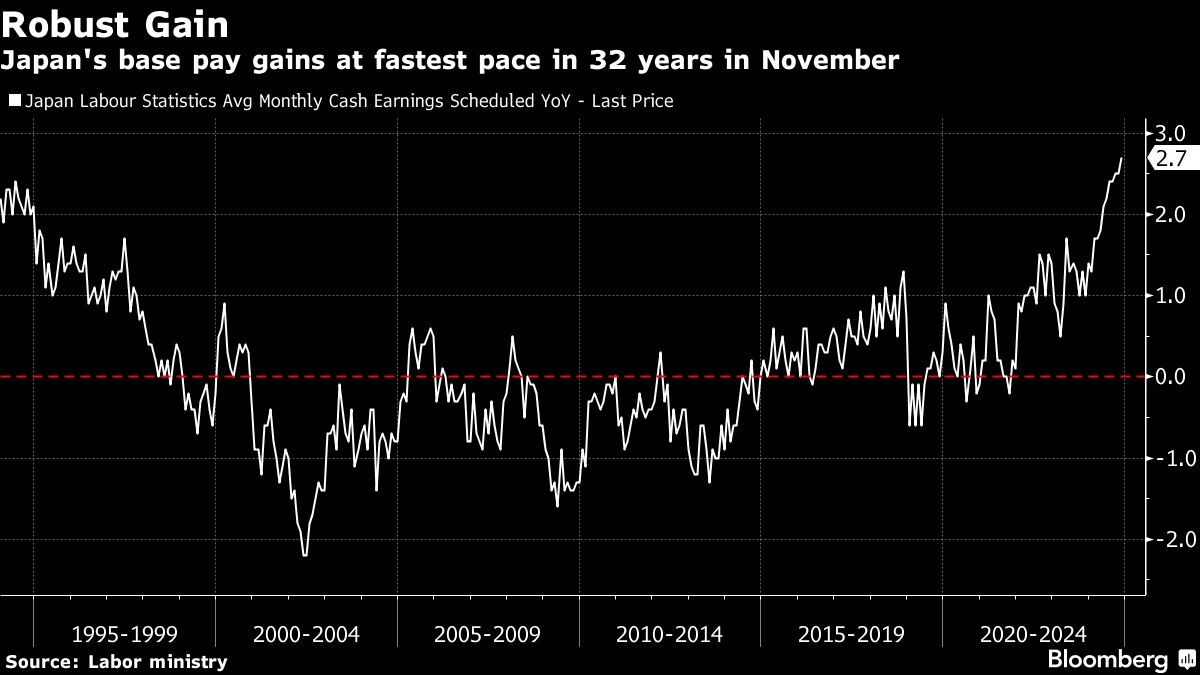
(Jan 9): Japanese workers’ base salaries grew the most in 32 years, offering potential support for the central bank to raise rates this month if other data back up the thesis that a positive economic cycle is strengthening.
Base salaries increased by 2.7% in November from a year ago to drive up nominal wages by 3%, the labour ministry reported Thursday. Economists had expected nominal pay to rise 2.7%. A more stable measure of wage trends watched by the central bank that avoids sampling problems and excludes bonuses and overtime showed wages for full-time workers gained 2.8%, remaining at or above 2% for 15 months.
The yen strengthened slightly against the dollar following the report, gaining up to 158.10.
In a more discouraging sign, real cash earnings dropped 0.3% from a year earlier, extending the streak of declines to four months. Stagnation in real wages was partly driven by inflation outpacing pay growth, as price gains strengthened in November after the government halted subsidies for utility bills, pushing up energy costs.
The steady wage trend may refuel speculation over a near-term rate hike from the Bank of Japan, including in the upcoming policy decision meeting this month. Since Bank of Japan Governor Kazuo Ueda gave dovish comments at the post-December meeting press conference, market participants’ views have tilted toward expecting the next policy change to come later.
“Today’s data doesn’t necessarily indicate the wage trend has improved dramatically,” said Yuya Kikkawa, an economist at Meiji Yasuda Research Institute. “Still, the BOJ could hike if there is additional positive information, for example from brnach managers’ hearings.”
The central bank is scheduled to release its latest regional economic report following its branch managers meeting later Thursday, and Deputy Governor Ryozo Himino is set to give a speech to local business leaders in Yokohama next week.
Last month Ueda said that he would like to see more data before making further tightening steps, including signs of sustained wage growth. That has drawn attention to the latest data on pay, as the country heads toward the annual spring wage negotiations.
What Bloomberg Economics Says...
“A surprisingly strong rise in labour cash earnings in November will likely increase the Bank of Japan’s confidence that wages are bolstering consumer price trends toward securing its 2% target.” — Taro Kimura, economist
Last year the BOJ conducted its first rate hike in 17 years in March, shortly after the nation’s largest trade union federation Rengo announced that its members had secured the highest wage increases in over three decades.
This year, Rengo plans to release its initial tally on March 14, five days before the BOJ’s policy meeting results for that month. Rengo is aiming for at least a 5% wage increase across all companies, with a slightly higher 6% target for small and medium-sized enterprises.
“We are expecting this year’s spring wage negotiations to conclude at somewhere around 5%, not much of a slowdown from last year’s 5.1%,” said Meiji Yasuda’s Kikkawa. “Labor shortages will likely sustain pay momentum.”
Ueda also indicated in December that the momentum of wage negotiations could become apparent even before Rengo’s official tally in March.
There are already some promising signs from individual companies, including retail giant Aeon Co and insurer Nippon Life Insurance reportedly planning to raise the salaries of some employees by at least 6%. Japan’s persistently tight labour market is also likely to keep pressure on companies to continue raising wages to attract and retain talent.
Still, unlike large corporations who are remaining relatively optimistic, smaller firms are increasingly voicing concerns about the feasibility of sustained wage hikes. In 2024, over 50% of SMEs said they gave up raising salaries, with many citing challenges in passing on costs to customers and weak profit outlooks, according to a survey conducted by the Shinkin Central Bank Research Institute during the peak of wage talks.
The government has also ramped up its calls for wage increases, with Prime Minister Shigeru Ishiba re-affirming in a new year speech his commitment to achieving economic growth through pay gains and increased investment.
Ishiba also reiterated his goal of raising Japan’s minimum hourly wage to ¥1,500 (US$9.49 or RM42.74) within the next five years, which would require an increase of more than 7% per year. The minimum wage currently stands at ¥1,055, following a recent adjustment in August, with the changes reflected from October payrolls.
Uploaded by Chng Shear Lane
- Appellate court upholds quashing of proposed RM86.77 mil fine against Grab, two others
- Richest woman in Indonesia loses US$3.6b in just three days
- Affin Bank to distribute Bitcoin fund managed by Halogen Capital
- Malaysian shares dip as investors return from holiday with caution
- Private hospitals association reject calls for three-year costs freeze, regulation of pharmaceutical pricing
- Foxconn sees server revenue surpassing iPhone revenue in two years — report
- TSR bags RM219 mil earthworks contract in Kwasa Damansara
- Ex-PM Ismail Sabri quizzed by MACC for over six hours
- Global 195 legal coalition set up to pursue Israeli war crimes suspects for crimes against humanity in Gaza
- Close to 5,000 ESG funds in Europe now hold oil, gas and coal

